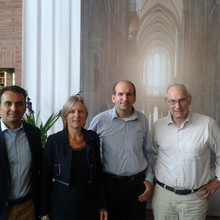HOMER - From History to Memory Culture: Narratives of the European Council Summits
Heads of the Project :
Prof. Dr. Jürgen Mittag (German Sport University Cologne)
Prof. Dr. Klaus Kiran Patel (University of Maastricht)
Prof. Dr. Sophie Vanhoonacker (University of Maastricht)
Prof. Dr. Wolfgang Wessels (University of Cologne)
Envisaged Period of the Project:
October 2014 - September 2017
Seminars
Funding:
European Commission
Mission and Major targets of the project
HOMER is a six step research-based teaching program that seeks to identify narratives, focusing on three history making summits of national leaders in the history of European integration.
HOMER’s key points:
- HOMER is of high political and societal relevance since it provides historical and cultural orientation on European memory by identifying master narratives of European integration.
- HOMER will have a strong academic impact since it will generate new insights into the perceptions of the role of the European Council and its summits that have received limited scholarly attention thus far.
- HOMER has a strong transnational impact since it brings together the German Sport University Cologne (GSU), the University of Cologne, and the University of Maastricht.
- HOMER is fully interdisciplinary by bringing together four leading EU experts representing history and political science.
HOMER’s background:
- The future of the European Union will increasingly be shaped by the perception of its history and an evolving European memory culture. Against this backdrop, it is necessary to pay more attention to the European Council which has been the key institution in terms of history making decisions.
- The project will address three critical junctures in order to analyse their impact on the development of European narratives: The almost forgotten 1969 summit of The Hague was central to the emergence of the EU and the European Council as an entity. The Maastricht summit of 1991 was a history-making act for the deepening of European integration.The 2007 summit of Lisbon that led to the 2009 Treaty of Lisbon opened a new age for the construction of the EU. The project will assess these summits and analyse their roles in developing a ‘master narrative’ of European integration. The main rationale of the project is to contribute to the evolving European memory culture by scrutinizing past and existing interpretations while simultaneously building on these.
The general structure of HOMER is based on an annual six step-approach:
- a yearly workshop in Brussels (research, dialogue and event dimension)
- a yearly joint seminar (teaching dimension)
- a yearly online module (international dissemination) linked with the respective workshop and seminar
- a series of four annual public lectures (two at each university; local/regional dissemination)
- four annual issues of a newsletter and a regularly updated homepage
- a final journal article at the end of the third year.
Each year one of the three summits will be tackled by HOMER:
- first year: the summit of The Hague 1969
- second year: the European Council taking place in Maastricht 1991
- third year: the Lisbon summit 2009 that opened a new age for the construction of the EU and generally for Europe.
The project will address these three critical junctures in order to analyse their impact on the development of European narratives. It will be of vital interest to explore the question of how contested interpretations of historical and recent events are made active in the present, thereby uniting and dividing European societies.
